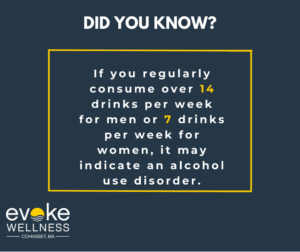You wake up with a slight headache and reach for the bottle. It’s earlier than usual, but you need it to steady your nerves before work. The days blend together, anchored by familiar routines – morning drinks to take the edge off, sneaking a nip or two at lunch, and finishing off the day with a few cocktails. You hold down a job, pay your bills, and keep up appearances. But the drinking has slowly become more frequent, creeping into mornings and afternoons. Friends mention your ruddy complexion, but you laugh it off. No one would label you an alcoholic – you’re a high-functioning, productive member of society. Yet when you tally the mounting empty bottles, it’s clear the drinking has become problematic. Does this sound familiar? If this resonates with you or a loved one, call us at (617) 917-3485 today or reach out online.
What Is a High-Functioning Alcoholic?
A high-functioning alcoholic is someone who appears to be successful in life despite drinking excessive amounts of alcohol. These individuals are often able to maintain jobs, relationships, and other responsibilities while struggling with an alcohol use disorder.
Outward Appearance
On the surface, high-functioning alcoholics may seem to “have it all together.” They can be highly productive, intelligent, and even high-achievers in their careers or academics. Their drinking habits may go unnoticed or be dismissed as harmless.
Internal Struggles
However, behind closed doors, high-functioning alcoholics battle with the physical and emotional tolls of alcohol abuse. They may experience blackouts, hangovers, mood swings, and strained relationships. Their drinking often serves as a coping mechanism for underlying issues like anxiety, depression, or trauma.
Dangers of Denial
One of the most significant risks for high-functioning alcoholics is denial. Because they can maintain an outward appearance of normalcy, they may convince themselves that their drinking isn’t problematic. This denial can prevent them from seeking the help they need, putting their health, career, and relationships at risk.
Signs of a Functional Alcoholic
While functional alcoholics can maintain employment and responsibilities, their excessive drinking often manifests in subtle ways:
Strained Relationships
Alcohol abuse strains personal and professional relationships. You may notice an alcoholic becoming defensive, withdrawing emotionally, or lashing out irrationally. Spouses or partners frequently complain about broken promises and neglected duties.
Poor Self-Care
Alcoholics tend to neglect personal hygiene, nutrition, and exercise in favor of drinking. Disheveled appearances, weight fluctuations, and frequent illnesses can signal a drinking problem.
Memory Lapses
Binge drinking impairs the brain’s ability to form new memories. Alcoholics often experience blackouts, forgetting conversations or actions while intoxicated. Chronic memory issues may develop.
Unreliable Behaviors
Alcohol abuse causes erratic mood swings and unpredictable behaviors. You may miss appointments, deadlines, or social engagements due to hangovers or impaired judgment when drinking.
Recognizing these signs early allows alcoholics to seek the help they need before more severe consequences arise. Any combination warrants an honest self-evaluation.
Impact of Being a Functional Alcoholic
Health Consequences
Being a functional alcoholic can have severe physical and mental health repercussions. Prolonged heavy drinking increases the risk of liver disease, heart problems, cancer, and brain damage. It also weakens the immune system, making you more susceptible to illnesses.
Emotional Toll
Functional alcoholism takes an emotional toll. You may experience mood swings, depression, anxiety, and difficulty managing stress. Alcohol’s numbing effects can temporarily mask deeper emotional issues that eventually resurface.
Social Isolation
Although functional on the surface, alcohol dependency often leads to social isolation. You may prioritize drinking over relationships and activities you once enjoyed. This strains personal and professional connections over time.
Enablement of Addiction
By appearing functional, alcoholism can be easier to justify or ignore. However, this enables the addiction to progress unaddressed. Seeking help earlier leads to better treatment outcomes.
Getting Help as a Functional Alcoholic
Seeking Support
It’s crucial to acknowledge that functional alcoholism is a serious condition requiring professional help. While you may appear to be managing daily responsibilities, the long-term effects of alcohol abuse can be detrimental. Reach out to trusted friends, family members, or a therapist for support in addressing your drinking habits.
Treatment Options
Various treatment options are available, including counseling, support groups, and, in some cases, medication-assisted treatment. Some people may even require an alcohol detox program to safely manage withdrawals from alcohol. Consider seeking guidance from an addiction specialist or a reputable rehabilitation program tailored to your unique needs. Recovery is a journey, and having a strong support system can make a significant difference.
Prioritizing Self-Care
Along with seeking professional help, it’s essential to prioritize self-care practices. Engage in activities that promote relaxation, such as exercise, mindfulness meditation, or pursuing hobbies that bring you joy. Building a healthy routine can aid in managing cravings and improving overall well-being.
Signs of a Functional Alcoholic
Drinking in Excess
One telltale sign is drinking far more than the recommended limits. If you regularly consume over 14 drinks per week for men or 7 drinks per week for women, it may indicate an alcohol use disorder.
Poor Control
Even though functional alcoholics can often maintain jobs and relationships, they struggle to control their drinking habits. Frequently downing multiple drinks in a single sitting or being unable to stop once starting are red flags.
Prioritizing Alcohol
Functional alcoholics tend to organize their lives around alcohol consumption. Plans revolve around drinking opportunities, and they grow irritable if unable to drink as desired.
Risky Behaviors
Engaging in risky behaviors like drunk driving, blacking out frequently, or mixing alcohol with medications or other substances can also signal a problematic relationship with alcohol.
While functional alcoholics may appear to “hold it together,” these signs suggest the need for professional support to avoid potential health, relationship, and occupational consequences down the line.
Risk Factors for Functional Alcoholics
Genetics & Family History
Having a close blood relative with alcohol use disorder significantly increases your risk of developing a drinking problem yourself. This genetic predisposition combined with environmental factors can pave the way for functional alcoholism.
Mental Health Issues
Many people with undiagnosed or undertreated mental health conditions attempt to self-medicate with alcohol.This unhealthy coping mechanism can spiral into alcohol dependence over time. PTSD treatment programs as well as depression treatment programs can aid in preventing such a spiral.
High Stress Levels
Chronic high stress, whether from work, relationships or other life circumstances, is a major risk factor. Drinking to unwind and relax after a stressful day can gradually become a harmful pattern.
Early Exposure
Those who started drinking at a young age are at higher risk of becoming functional alcoholics later in life. Early initiation often stems from family/peer influences and poor coping strategies.
Getting Help as a Functional Alcoholic
As a functional alcoholic, seeking help can be challenging, but it is crucial for your well-being. Admitting the need for support is the first step towards recovery. An intensive inpatient program offers a structured environment to address your alcohol dependence comprehensively.
Comprehensive Treatment
In an inpatient facility, you’ll have access to a team of professionals who specialize in addiction treatment. This multidisciplinary approach combines medical care, counseling, and support groups to address the physical, psychological, and social aspects of alcoholism.
Safe and Supportive Environment
Intensive inpatient programs provide a safe, controlled environment away from triggers and temptations. This seclusion allows you to focus solely on your recovery without external distractions or access to alcohol.
Aftercare Planning
Reputable inpatient programs also emphasize aftercare planning to ensure a successful transition back into everyday life. This may include individual therapy, support group meetings, and relapse prevention strategies to maintain sobriety long-term.
FAQ on Functioning Alcoholism
What is functional alcoholism?
Functional alcoholism refers to the ability to maintain responsibilities like work, family, and social obligations despite struggling with alcohol use disorder (AUD). It doesn’t mean the drinking isn’t problematic – just that outward dysfunction is less visible.
How can I tell if I’m a functional alcoholic?
Warning signs include drinking alone frequently, experiencing blackouts, prioritizing drinking over other activities, and needing to drink more for the same effect. Increased tolerance and withdrawal symptoms when not drinking are also red flags.
Is functional alcoholism sustainable long-term?
No. Over time, functional alcoholics face higher risks of job loss, relationship strain, worsening mental/physical health issues, and full-blown addiction. Early intervention is crucial to avoid spiraling consequences.
Conclusion
While functioning alcoholism may seem harmless on the surface, it can quickly escalate into a dangerous addiction that takes over your life. Listen to the concerns of loved ones and be honest with yourself about your drinking habits. Seek professional help to develop healthier coping strategies before your reliance on alcohol causes irreparable damage to your relationships, career and wellbeing. You deserve to live a full life free from dependence. With courage and commitment, you can overcome this addiction and reclaim your best self. Though the road may not be easy, you have the inner strength to walk it one step at a time. A brighter future awaits without alcohol. Take the first step today.
Begin Your Journey with Evoke Wellness at Cohasset
If you or a loved one is considering treatment, Evoke Wellness at Cohasset invites you to contact us. Our compassionate team is ready to answer your questions, discuss your needs, and help you take the first steps toward recovery. In Cohasset, you’ll find more than just a treatment program – you’ll discover a community dedicated to your wellness and success. Together, let’s embrace the journey to recovery and the promise of a new beginning. Call us at (617) 917-3485 today or reach out online.





